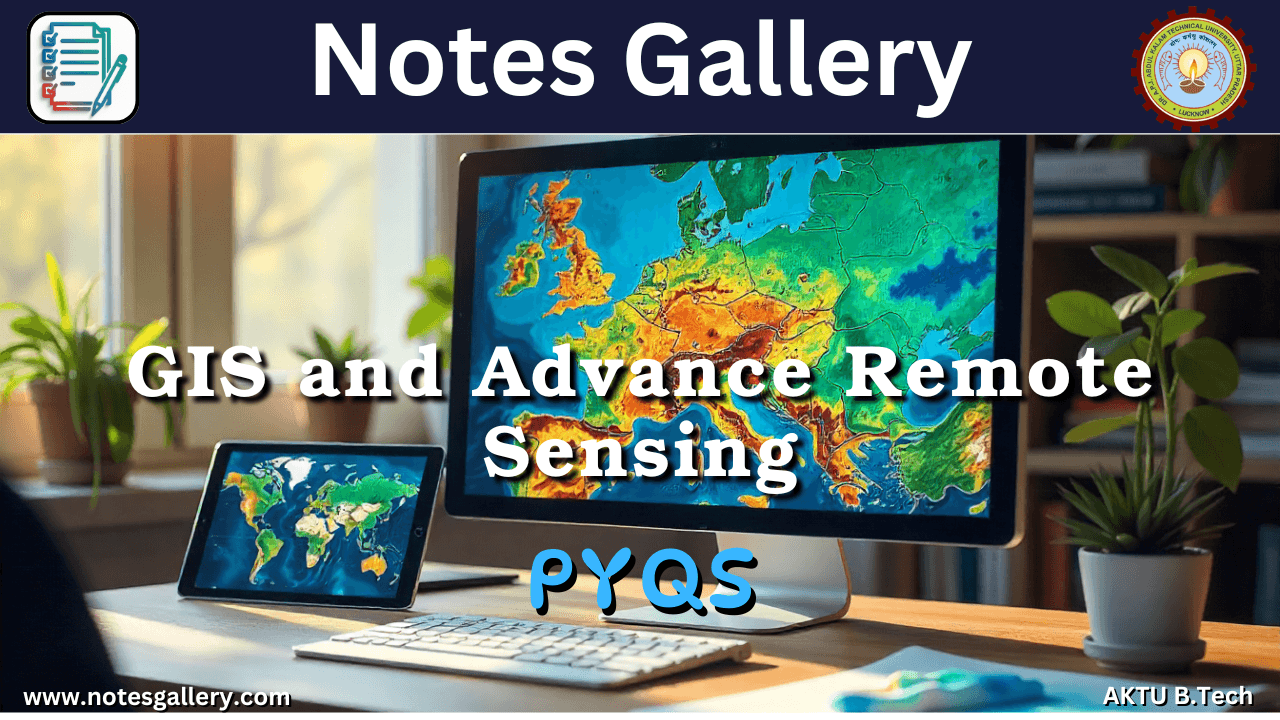GIS and Advance Remote Sensing is one of the most important subjects in the Civil Engineering curriculum because it connects modern technology with real-world infrastructure planning, environmental monitoring, and disaster management. For AKTU students, having access to Civil 3rd Year AKTU PYQS (GIS and Advance Remote Sensing) is extremely helpful for understanding question patterns, repeated topics, and the depth of explanations expected in exams. Since the subject is both conceptual and application-based, PYQs give students a clear idea of how to structure their answers and what areas need more attention.
Click Links given below for notes/Imp. Question/PYQs
https://notesgallery.com/aktu-b-tech-1st-year-free-study-materials/ First Year
https://notesgallery.com/aktu-b-tech-2nd-year-free-study-materials/ Second Year
https://notesgallery.com/aktu-b-tech-3rd-year-free-study-materials/ Third Year
https://notesgallery.com/aktu-b-tech-4th-year-free-study-materials/ Fourth Year
Importance of GIS and Remote Sensing in Civil Engineering
In today’s engineering world, GIS (Geographic Information System) and Remote Sensing act as the backbone for land use planning, transportation engineering, natural resource mapping, and environmental studies. Civil engineers frequently rely on satellite images, spatial data, and digital mapping tools for project planning. The Civil 3rd Year AKTU PYQS (GIS and Advance Remote Sensing) show that the subject holds significant weight because the concepts are widely used across advanced civil engineering fields. Understanding PYQs helps students master definitions, applications, components, and case studies related to GIS and remote sensing.
What PYQs Reveal About Exam Trends
Solving the Civil 3rd Year AKTU PYQS (GIS and Advance Remote Sensing) gives students a clear understanding of commonly asked topics. AKTU frequently repeats theory-based questions about GIS components, satellite image interpretation, electromagnetic spectrum, data acquisition, and spatial analysis. Many PYQs focus on vector vs raster data, advantages of remote sensing, resolution types, sensors, platforms, and GPS principles. Students also notice that questions about data storage, digital elevation models, and georeferencing appear in almost every exam cycle. Understanding these patterns helps in efficient revision and scoring.
Key Areas Highlighted Through PYQs
Students preparing through PYQs should focus on essential chapters such as fundamentals of GIS, data structures, spatial analysis, image classification, and remote sensing applications. The Civil 3rd Year AKTU PYQS (GIS and Advance Remote Sensing) show that AKTU prefers questions that test conceptual clarity rather than numerical solving. Therefore, strong command over terms like pixel, spectral signature, geocoding, topology, buffer analysis, and map overlay techniques is crucial. PYQs also include short notes on satellites, orbits, sensors, and digital image processing techniques like filtering, enhancement, and classification.
How GIS Concepts Are Tested in Exams
GIS-related questions in PYQs often revolve around the framework of GIS, such as hardware, software, data, personnel, and methods. Students are expected to explain GIS workflow, including data input, storage, manipulation, and visualization. The Civil 3rd Year AKTU PYQS (GIS and Advance Remote Sensing) highlight that map projections, coordinate systems, spatial queries, and thematic mapping are frequent exam topics. Understanding these concepts allows students to answer confidently and score well in both long and short questions.
How Remote Sensing Concepts Are Presented in PYQs
Remote sensing questions usually focus on satellite systems, interpretation techniques, resolutions (spectral, spatial, radiometric, temporal), and energy interaction mechanisms. The Civil 3rd Year AKTU PYQS (GIS and Advance Remote Sensing) show that AKTU expects students to describe how remote sensors capture information, how images are processed, and how classification methods such as supervised and unsupervised learning work. Exam questions also include applications like agriculture monitoring, flood assessment, forest mapping, water resource analysis, and urban expansion studies.
Why PYQs Are Essential for Scoring High Marks
PYQs give students a practical roadmap for exam preparation. The Civil 3rd Year AKTU PYQS (GIS and Advance Remote Sensing) help reduce confusion, increase confidence, and provide clarity on repeated and high-weightage topics. Since the subject is theoretical, PYQs help students learn how to write compact, relevant, and exam-ready answers. PYQs also help students revise diagrams, flowcharts, and examples that boost exam presentation. By practicing PYQs, students understand how to frame answers for definitions, comparisons, and descriptive explanations, which increases their chances of scoring higher marks.
Study Strategy for This Subject Using PYQs
A smart preparation strategy begins with dividing the subject into GIS concepts, remote sensing principles, and applications. After understanding each topic, students should practice the Civil 3rd Year AKTU PYQS (GIS and Advance Remote Sensing) to see how questions are framed. Preparing summary notes, diagrams of satellite systems, GIS processes, and classification flowcharts is beneficial. Students should revise repeated questions multiple times since AKTU often asks similar questions every year. This approach makes revision organized and helps in retaining key concepts for the exam.
Final Thoughts
The Civil 3rd Year AKTU PYQS (GIS and Advance Remote Sensing) are a valuable tool for every civil engineering student aiming to score well in this subject. They offer insights into exam patterns, highlight important topics, and make preparation easier. With consistent practice, conceptual understanding, and clear writing, students can confidently score high marks. This subject becomes scoring when prepared strategically using PYQs, making them essential for AKTU exam success.
